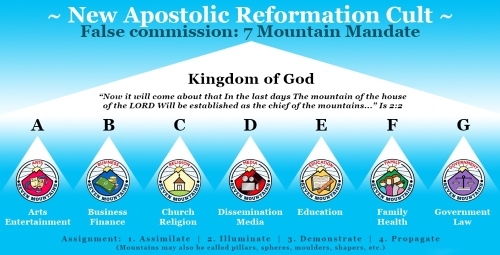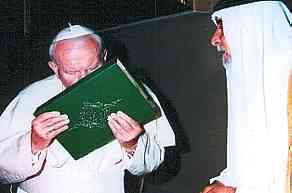In this world there are lots of denominations in Christendom. Lots of Christians say that the non-trinitarian christians belong to cults or sects, but clearly than they forget what the characteristics of a sect or cult are.
The many non-Trinitarians who found one or another denomination in which they go to meetings are all free people with no obligations to that meeting, congregation or church except to live according to the commandments of God. In nearly all other Christian denominations of trinitarians we can find churches which dare to say they are the only church by which people can be saved or “go to heaven”. Nearly all of them are weekly asking money to their parishioners or even ask a tithing. Whilst in most of the non-trinitarian churches the parishioners are free to give or not to give any amount of money and are not pushed to do so. Never are they threatened by a so called burning in hell for ever, because such false teaching even does not exist by them.
Anna in Shadowland is a web-blog from a certain Andrea which represents the view of a disillusioned girl who left her own church to have an experience in a Charismatic church influenced by the New Apostolic Reformation. She writes
Every so often I receive testimonies from people who have read my “Leaving the NAR Church” series. There are more than 50 of them, and I am adding another. These stories are precious to me, and serve as a painful reminder that there is hope for the dear deceived ones caught up in this insidious movement. If you don’t know what NAR is, I hope you’ll take a moment and read What is the New Apostolic Reformation Movement. {Leaving IHOP and the NAR: Sammy’s story}
She has a testimony about how the good and faithful God she loves and wanted to serve opened her eyes and removed her from the clutches of the deception, lack of discernment, and false teachings of a movement that has invaded the worldwide church on a massive scale. {An open letter to the church I left}
In Christendom and Christianity we may see many churches who claim to be adhering to ‘authentic New Testament practices’ but when we look closer at them we find all sorts of practices which are not according to the lifestyle of the first Christians (which we can come to know from the Acts of the Apostles and from civil writings of the first century CE).
Today there are several churches who love to attract people with their “Speaking in tongues” and all sorts of trance movements, even not minding to have people in hysterics, shaking on the floor to the very contemporary music of Hillsong and Bethel (not to be confused with the Bethels of the non-trinitarians), surrounded by all their technological advances, big screens, and coffee bars, and all the other comforts of modern convenience that they manage to accumulate around them.
Although it sure is a whole lot of fun and I have to admit, you had me fooled there for a while. {An open letter to the church I left}
does the blogger says after her eyes were opened. Continuing
I was really starting to climb up that ladder to sit there with you because I’m sure the view is amazing. But thankfully I could never quite manage to get there, and these days I actually find it rather insulting that anyone can claim to be living ‘authentic Christianity’ just because they belong to a certain kind of church. {An open letter to the church I left}
The blogger Andrea thinks
seeking after a truly authentic apostolic life and experience would be completely unattainable, because I currently live in 2017. {An open letter to the church I left}
but than she forgets we do have enough civic papers, next to the biblical account, to give us a fair image how life was by the first century followers of the Nazarene Jewish master teacher Jeshua (Jesus Christ).
Naturally she should also know that life 2000 years later is so different that we should take that into account too.
Today we see a growing amount of people loving the ‘New Apostolic Reformation’ (NAR), a movement which seeks to establish a fifth house within Christendom, distinct from Catholicism, Protestantism, Oriental Orthodoxy, and Eastern Orthodoxy. Some of that church, at the moment, say they are ‘Charismatic’ others say they are a ‘New Testament’ or ‘Apostolic Household’ church and do not belong to the Charismatic movement.
For sure all the modern Holly-Bolly-Woody-Booly modern entertainment forms a very attractive asset to lure people in the community. At several places in the United States certain movements took place which were noticed by C. Peter Wagner to fall under the same denominator. Unlike several sects or cults groups it is not some secret society or shadowy organization. They started to find like-minded people who had no intention to overthrow world governments or undermining the Church. For many of them the “New Apostolic Reformation” started off as a name giving for a movement that was going through the established church. Nothing more but a term used to classify a subset of people throughout denominational and non-denominational Christendom who seem to share some common characteristics.

In Christendom we may find lots of churches which not only worship a Trinity, but also believe that the Holy Spirit is with them and moving around in their church even in such a way that this spirit would choose special pastors, giving them a special role in the Church of God and/or in the Kingdom of God. They may come up with many different stories even telling that people got ‘gold dust’ on their hands.
One of them was the wife of one of your pastors/elders, and she very excitedly and animatedly told us how the ‘spirit had been moving’ in a certain meeting, because the people had seen ‘gold dust’ on their hands. {An open letter to the church I left}
Andrea remarks
it is easy to dismiss the ‘manifestations of the spirit’ thing when someone is interpreting a verse of scripture about ‘being filled with the spirit’ or ‘being drunk in the spirit’, while you are sitting under the cloud of false teaching. But when you realize that these kinds of ‘manifestations’ are actually completely absent in scripture, and had been completely absent in the church until only a couple of years ago, that is when you sit up and take notice. And then when you realize that during all that time it had actually been present in the occult and Eastern mystic religions, that is when you start opening up a whole can of worms. That is when you get up and walk out of a meeting before the end, leaving behind some dear friends who are violently convulsing on the floor, and shaking in fits of ‘holy laughter’. That is when you walk out of a large WOF centre from a Jesus Culture ‘revival’ concert, feeling like you had just walked out of the depths of hell, and all the while absolutely hating yourself for having such feelings and for questioning ‘the work that God is doing through the moving of His spirit’.
And you’re asking yourself ‘Is this really the God that I know?’, but still you are convinced that the problem lies with you because you are ‘not open to the spirit’, because that is what you’re being told over, and over, and over again. And then you get pushed, and pushed, and pushed to get baptized so that you can also ‘receive the spirit’, and you’re left scratching your head because you had thought that because you were already a believer, you had already received the Holy Spirit, but the word ‘obedience’ gets thrown at you over, and over, and over again. And this is when you start to see the indoctrination above the doctrine. {An open letter to the church I left}
People should come to see that at such point they do come in the danger zone. There it is, where we would differentiate between a through church and a cult or sect. Whilst non-trinitarians do keep to the biblical teachings and are not pushing people to come into their church, afterwards demanding all sorts of obligations, and not letting people easily go, this is typical for the cult groups we notice in the trinitarian churches. Also when people then want to leave such a church or group we notice the leaders of such community want to give a ‘guilt feeling’ to the person who wants to leave.
Andrea gives a nice example how such cults or groups work
Instead you preyed on my hurt and my weakness, and used it to set your trap, so that you could be the ones who avoided the issue. This leads me to believe that, despite the deceptive façade, you actually have no idea who you are or what you believe, and you are carried about by every wind of doctrine. If this was not so, you would have had no problem answering all the questions I had first, despite any other issues that might have been present. {An open letter to the church I left}

Backsliding term used within Christianity to describe a process by which an individual who has converted to Christianity reverts to pre-conversion habits and/or lapses or falls into sin, when a person turns from God to pursue their own desire. – The story of the Prodigal Son has become a representation of a backslider that repented. Engraving of the Prodigal Son as a swineherd by Hans Sebald Beham, 1538.
In most such dominating churches we can see that they try to put the guilt feeling by accusing that person who has objections of being a backslider. Saying that the faith is watering down because the person is going the wrong way, spiritually. They want to have the doubting person to believe all lies within him or her. Saying that he or she is regressing rather than progressing and that there is no proof any more of a commitment to Christ or that a certain standard of behaviour is not there any more.
DivideTheWord.blog, a cloud-based ministry who claim to have as purpose to spread the Gospel of Jesus Christ to the world in such a way as to be available to all of God’s children, saying it is free from denominational judgmentalism, free from race, colour or creed stipulations, brings a testimony
Having been a member of an independent Oneness Pentecostal (Apostolic) church for fifteen years, gaining a 4-year degree from a Oneness Pentecostal Bible College, and being involved in many ministries within that church, to them, I am now completely backslid. I know the doctrines. I learned the dogma. I defended it ardently.
I justified foul behavior for the purity of the doctrine and I even considered, as they do, all other Christians, lost. According to Apostolic Oneness Pentecostals (the majority, there are personal exceptions) all other Christians, be they Baptist, Lutheran, you name the group, they will not be going to heaven, because they do not follow the Pentecostal doctrines.
And when I finally had enough of the stink of judgmentalism, elitism, self-righteous pomp, the hypocrisy of their holiness standards, I backslid. I left the church. I’ll never return, nor attend another Oneness Pentecostal church again.
But something miraculous happened to me, and to hundreds, and thousands of others I’m connected to via this blog, my YouTube channel and many recovery based online groups;
I backslid, right into Jesus {I Backslid Into Jesus}
Also Andrea writes
I can assure you that I am anything but a ‘lukewarm’ Christian. {An open letter to the church I left}
The woman who likes to think of the NAR as a ‘mega cult’ or an ‘out-of-control cult’ seems to have not such nice experiences, though at first it looked even so attractive she left her ‘old’ traditional church.
For her
Praise and Worship during a Catholic Charismatic Renewal Healing Service.
It is probably important, at this point, to also note its interconnectedness with the Signs and Wonders, and Word of Faith movements. And that it is also known or characterized by a bunch of other terms, like ‘Dominionism’, ‘The Third Wave’, ‘Kingdom Now Theology’, ‘Joel’s Army’, ‘Manifest Sons of God Doctrine’, ‘Charismania’, ‘The Seven Mountain Mandate’, and ‘The Fivefold Ministry’, to name only a few. And that its precursor was ‘the New Order of the Latter Rain’, a discredited movement out of which a lot of current day NAR teachings is derived. It seems to be an ever changing, constantly evolving and expanding movement, which is what makes it so hard to pinpoint and, I believe, is part of its deceptiveness. {Eighteen Months in a Cult: Prologue}
In Pentecostalism there may be found so many subgroups that often people can not see the woods any more because of the trees. Some of those groups evolve around one ‘spiritual leader’ who can have many people under his spell. Some groups have an end to their existence when the pastor dies, others have a longer life.
In the book ‘A New Apostolic Reformation? A Biblical Response to a Worldwide Movement’, Geivett & Pivec writes:
“Whereas the Latter Rain revival lasted only a few years, NAR has been around for more than thirty years – since the 1980s, when the office of prophet began to be restored. NAR teachings have gained enough momentum for an entire generation of young people to be raised in churches that promote them. For these people, NAR teachings are at the heart of Christianity.”
Andrea was raised Reformed, and writes
– that is, the other reformation. Whereas the NAR is a falling away from the authority of Scripture towards ‘experiences’, ‘encounters’, and ‘new revelations’, the Protestant Reformation was a return to the light of Scripture. To the eternal things that God has already promised and revealed in His Word, and to recognizing it as the only truth and authority to live by. Hence one of the battle cries was Sola Scriptura – Scripture Alone. And even though I do not remember the emphasis ever really being placed on the fact that we were Reformed, or being taught exactly what that even meant, this was very much the culture and mind set I had grown up with. {Eighteen Months in a Cult: Prologue}
For the Mega-churches and Pentecostal Churches youngsters are an easy prey because they are not so much interested in pure words of the Scriptures, but like more “ambience” with song and dance and special actions, like seeing people going in trance or watching unbelievable things like people nearly going mad.
Andrea also admits
when you are a young person, still searching for passion and a sense of purpose, it is very hard to disagree with those who say that the traditional church is ‘dead’. And hymns, structure and doctrine simply does not seem all that relevant and exciting anymore.
So for me, when the opportunity presented itself to become part of a young, vibrant, hip & happening church, suffice it to say that I did not hesitate for very long. Even though the circumstances of how I came to be introduced to this church was accompanied by a sense of hurt and rejection, I nevertheless grabbed the opportunity to join what seemed like a genuinely committed, and caring, community of believers. I was hoping, and expecting, to have my faith nurtured and strengthened in the process. {Eighteen Months in a Cult: Prologue}
Question is how much such attractive groups can nurture a person in the good sense. We should know it is really god’s Word that must give guidance to people. It is the Bible which can give us the most correct education and foundation for a good faith.
When not much attention is given to the text from the Bible, people shall miss out edifying material, for reproof and profitable for correction for building up a life according to the Will of God.
When to much attention is giving to the pleasures of life or to the human or natural flesh the real faith can not grow. Mike sojournerphoto remembers
I (was) removed from these organisations many years ago – initially with judgement in my heart – but have since watched the ‘Toronto ‘blessing’ and such stuff thrive. I became increasingly appalled at what was happening and now am amazed that it continues, ever more subtle. I remember a dark day sitting in ‘my church’ sometime around 1986 or 7 and the band deciding to play on after the service to ‘continue to seek God’ and as looked down it was a though there was a dark pit (not visual, so much as metaphorical) and I felt compelled to leave the building. I later came to recognise so much of this as seeking after ‘the flesh’ and to equate it with James observation on the ‘earthly, natural, demonic’.
Therefore let us remember that a true Christian church should be open, have no secrecy for its members nor for the outside world, and should give most attention to the Word of God, it is to readings from the Bible.

+
Preceding
Lovers of God, seekers and lovers of truth
Some one or something to fear #3 Cases, folks and outing
++
Additional reading
- Ideas about Religiosity
- Religions and Mainliners
- Parish, local church community – Parochie, plaatselijke kerkgemeenschap
- Expenses, costs – Onkosten, uitgaven
- Contribution – Contributie, bijdrage
- Follower of Jesus part of a cult or a Christian
- A small company of Jesus’ footstep follower
- Matthew 6:1-34 – The Nazarene’s Commentary on Leviticus 19:18 Continued 5 Matthew 6: 24-34: e) Anxiety and neighbor love
- Why we do not have our worship-services in a church building
- Why we do not keep to a Sabbath or a Sunday or Lord’s Day #6 Sunday or the Lord’s day
- Breaking up with a cult
- Evangelicalism in France on the rise
- Do those who want to follow Christ to be Jews
- What is the Full Gospel Business Men’s Fellowship International (FGBMFI)?
- What Doctrines came out of the Shepherding/Discipleship Movement (SDM)?
- Place for a fifth and sixth house in Christendom
- History of the NAR cult infiltrating the marketplace.
- Wagner the NAR and new wineskins
- C. Peter Wagner – The Don Quixote of Evangelicalism (Part 1): Knighted as a General.
- A new bible translation from the New Apostolic Reformation (NAR) group
+++
Related
- Christianity Is Not a Cult, It’s How It’s Taught
- So you want to be a Christian? [731]
- Cult…
- Cults around the World: Heaven’s Gate
- 049 :: Cult thinking
- Sects in the New Testament
- Q17: Sects and conflicts
- Cult Accusations Against the Body of Christ
- True Talk: What goes on within a sect?
- Same God – Different People
- #Tupper #Saussy PDF : Exposing the #Luciferan #Jesuit #Cult for what it is. #Catholic #Evil – YouTube
- Church of England downplayed extent of child abuse allegations, ritual abuse, padeophile cults, multiple personalities, FLDS – Fundamentalist Church of Jesus Christ of Latter Day Saints
- What is the New Apostolic Reformation?
- New Series: The New Apostolic Reformation
- Churchwatchcentral create a boogie man
- Should James White be disregarded as a valid voice in the field of Christian apologetics?
- James Goll Is a Tricky Devil: He Deceives After Warning People About the Devil’s Deception
- Prophetess Stacey Campbell Participated in and Promoted Catholic Event that’s in submission to the Magisterium of the Church
- Make Your Marine Demon Tap Out Through Full Immersion: Jennifer LeClaire’s Spiritual Hacks to Drowning Marine Demons
- NAR Nonsens
- N’ar John Silver
- When Church Invades Your Home
- Blame Cindy Jacobs for Terrorist Attacks and Tyrannical Leaders
- Psychic Fishing Expedition with John Edward and Shawn Bolz
- Cults on the rise in social media
- Cults of the World: Synanon
- Cults of the World: Aum Shinrikyo
- Cults of the World: Lundgren Cult
- Cults and sects – Jehovahs witnesses [702]
- Cults and sects – Christadelphians [703]
- Cults and sect – World Wide Church of God, Herbert Armstrong [706]
- Children Of God #Cult Was Hell On Earth. #Scotland
- Rating Cult Websites (and some background about the cults)
- I said #no ..’#In14ways #MercyfulGrace
- When Control Sets In – An Excerpt from my Book
- The Fall Rivers Cult
- A Bunch Of Rich White People From New York Are Being Arrested In Connection With A Sex Cult
- This Isn’t a Culture War — But a Patriotic Defense Against All Cults
- “Choose Freedom, Choose Happiness” – introduction
- Introduction – Prophet or Profit?
- My cult made me do comedy
- Card Catalog Review: Breaking Free: How I Escaped Polygamy, the FLDS Cult, and My Father, Warren Jeffs
- Bethel School Of Spiritual Drunkenness
- Drawning in mystery or Secrets with Courtney – a brief series on Scientology
- Video Comparison: Matt Chandler and Bethel Redding’s Shawn Bolz on the Same Page: Kooky Practices of Charismatic Things
- Are Phil Pringle’s ‘visions’ from God just as infallible as the NT Apostolic letters?
- Todd Bentley’s Vintage Heresy Oil and Prayer Cloths
- Experience Outweighs Scripture Implies Apostle Jennifer LeClaire
- Dr. Michael Brown Promotes Baby Throwing Evangelist Smith Wigglesworth
- Greater Works Epic Fail: Why Did Bethel Redding Need to Buy so Many Groceries for CARR Relief?
- I Backslid Into Jesus
- “Be strong and of good courage; be not afraid”
- Jesus The Way (2)















 Healing lies in coming home to the body. Whether it is recovery from trauma, abuse or addiction, learning to manage stress and be present with feelings, or releasing shame and media-conditioning to embrace our bodies as they are.
Healing lies in coming home to the body. Whether it is recovery from trauma, abuse or addiction, learning to manage stress and be present with feelings, or releasing shame and media-conditioning to embrace our bodies as they are.






